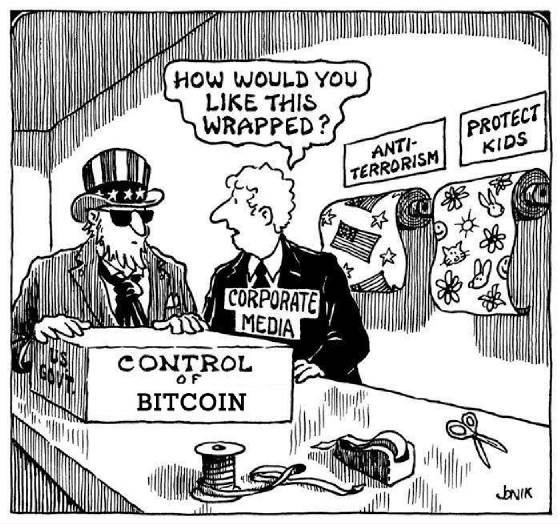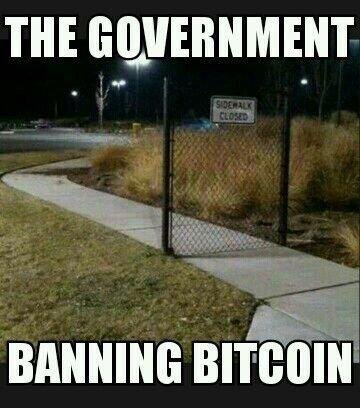by James Corbett
corbettreport.com
February 18, 2017
We all know the old dictum: "If you can't beat 'em, join 'em!" Well, governments have their own version: "If you can't beat 'em, use your jackbooted thugs to go out and steal their idea and outlaw all competition."
Case in point: bitcoin.
As I pointed out in my Tech Trends for 2017 editorial, bitcoin regulation is going to be one of the dominant themes of the year. Indeed, that prediction has (unfortunately) already come true, with the EU Council proposing the registration of all bitcoin users under the guise of "anti-terrorism" legislation and the IRS' legal pursuit of information on all Coinbase users continuing to play out in the courts.
Check the newswire on any given day and you'll see any number of government regulators looking to get their regulatory mitts on the cryptocurrency:
- Japan's new regulation regime for bitcoin and "other virtual currency" takes effect this April.
- The Philippines' Central Bank just issued a circular detailing a raft of new regulatory requirements for virtual currency exchanges.
- The Australian Digital Currency & Commerce Association has pre-empted the Aussie government by coming up with their own self-regulatory code of conduct.
But perhaps nowhere is this clampdown more obvious than in China, where the population's hunger for circumventing capital control laws is matched only by the government's hunger for clamping down on capital outflows. The booming Chinese bitcoin market has been widely recognized as the driving force behind the currency's meteoric rise in the last six months to once again pass the $1000 mark, and it has not done so without drawing renewed scrutiny from the so-called authorities.
After months of whispered speculation, rumors, gossip and leaks indicating a coming Chinese crackdown on bitcoin, some dramatic steps have been taken in recent weeks. First came news that the People's Bank of China had met with nine smaller local exchanges "to discuss risks and problems in the bitcoin market" (i.e., threaten them if they don't strictly enforce all rules and regulation). Then Okcoin and Huobi, two of the largest Chinese exchanges, surprised the market by announcing that they would be suspending withdrawals for one month so they could "upgrade" their systems to comply with "anti-money laundering efforts, foreign exchange management and other financial laws and regulations." Now BTCC (which, along with Okcoin and Huobi, comprises the "Big Three" of Chinese exchanges) has followed suit.
But this renewed pursuit of bitcoin by government regulators is not happening in a vacuum. As I reported earlier this week, the Chinese government has also just "completed the trial in transactions and settlements of bank acceptance bills using a digital currency it developed, supported by blockchain technology." In other words, China is prepping its own digital currency based on blockchain technology to help transition China into a cashless society.
For those who don't know, the blockchain is the key technological innovation upon which the bitcoin platform is based. It is, essentially, a distributed database where entries are created as "blocks" and ordered in a "chain" by a time stamp with a link to the previous block.
The innovation is that the database is autonomous, decentralized, permissionless and secure by design. As such, it makes a decentralized cryptocurrency like bitcoin (and many other virtual currencies) possible. There need be no central authority that verifies and certifies transactions, as the verification and time ordering of transactions are accomplished through proof of work (solving Hashcash puzzles in the case of bitcoin). Mining nodes validate transactions by solving these cryptographic puzzles and are rewarded with newly "mined" coin.
Of course, virtual currencies aren't the only thing that blockchains can be used for. Since a blockchain can be used to store records forever in an unalterable manner they are particularly useful for registration and record management, smart contracts and other applications that radically disintermediate society by cutting out the need for bankers, lawyers, registrars and other middle men who previously acted as witnesses and central authorities for recording and managing interactions between people.
You can see why governments see this technology as a double-edged sword: Wielded for their purposes, it presents a perfect platform for their Big Brother-esque ambition to oversee, manage, track, store and database all interactions between everyone, everywhere, instantaneously and at next-to-no cost. But wielded for free humanity's purposes, it makes almost every conceivable function of the government as obsolete and nonsensical as horseshoe makers and chimney sweeps are to modern society.
As a result, at the very same time we see this incredible, snowballing and omnipresent push to regulate bitcoin and other virtual currencies, we are also witnessing an incredible, snowballing and omnipresent interest in the idea of "private blockchains," distributed databases developed and used by governments, businesses, universities and bankers to cut their own costs and speed up their own transactions.
- The Bank of Canada's deputy governor has recently revealed details of the bank's "Project Jasper," an experiment to build "a simulated wholesale payment system" using blockchain technology.
- The US government has just created a Congressional Blockchain Caucus to "help policymakers create sound regulatory policies surrounding these technologies."
- The State Bank of India is partnering with tech companies and local banks on a "Bankchain" initiative focusing on blockchain applications.
- MIT is working on a Digital Currencies Initiative that is exploring various uses for blockchain technologies for government, central banks and business.
If the central bankers of the world have their way, private, centralized blockchains will be used to facilitate international trade and settlement by and for the bankers, and government regulations will stop any of those pesky citizens from transacting among themselves.
But don't worry, there is a silver lining to all of this: Bitcoin is ultimately uncensorable and unstoppable. Don't take my word for it, take the former Governor of the Bank of China, L H Li, who just told CCTV: "If you want to kill bitcoin, it will be an impossible task."
And he would know. After all the crackdowns on bitcoin exchanges in China, it seems the Chinese are just using alternative platforms like Localbitcoin to arrange for peer-to-peer or even face-to-face transactions instead of going through the exchanges. As it turns out, if you put arbitrary, government-imposed obstacles in people's way, they'll simply find other ways to interact that bypass those obstacles. Who would've thunk it?
The point is that there is no "off switch" for the bitcoin platform, no central node that can be disrupted, no server that can be seized, no premises raided, no person arrested that will take down bitcoin. That's the whole point of a decentralized, peer-to-peer distributed ledger. It means that unless and until governments can stop people from passing strings of letters and numbers to each other (even on physical pieces of paper) then bitcoin will never be brought down completely. Yes, governments can and will (and are) regulating the exchanges that most people use to change their fiat currency into bitcoin (and vice versa), but they can't stop people from transacting bitcoin.
In the end, this creates a strange and uneasy relationship between governments, banks and the general public.
Bitcoin exchanges will continue under increasingly burdensome regulatory restrictions, and setting up accounts and transacting with others via exchanges will eventually be more time-consuming and annoying than setting up a bank account.
And governments, banks and other large-scale institutions will increasingly be developing their own private cryptocurrencies for settling transactions amongst each other or private blockchains for performing record management and registration services. If you can't beat 'em, steal their idea and outlaw all competition!
Luckily for free humanity, it will be impossible to outlaw direct bitcoin transactions altogether. Bitcoin will continue to be traded directly, peer-to-peer, via LocalBitcoins and OpenBazaar and other platforms, or just plain face-to-face interaction.
NOTE: This editorial is part of The Corbett Report's weekly subscriber newsletter. For access to the newsletter and to support The Corbett Report, please consider becoming a Corbett Report member.




Of course, BitShares is a decentralized exchange not dependent on costly, power hungry miners. Low cost nodes can pop up from anywhere in the world so the ability to trade digital currencies anywhere is also fast, efficient, and unstoppable. Anticipating the events of this article is why BitShares was born.
Downvoting a post can decrease pending rewards and make it less visible. Common reasons:
Submit
I love seeing Stan as the first reply up on the very top of your comment list, this is awesome, as the creation of Bitshares was a preemptive move toward privacy and and self-empowerment when the time comes...
This time is quickly coming knocking at our doors not only here in North America, but definitely Asia, Europe and Oceania as well. May the rise of Bitshares decentralized autonomous platform rise bringing us all in safe heavens.
All for one and one for all! Namaste :)
Downvoting a post can decrease pending rewards and make it less visible. Common reasons:
Submit
Do you think the blockchain's dependency on electricity mightspark innovation of cheaper, sustainable, small-scale methods of energy production? I hope this becomes a positive side-effect because the decentralization availability of energy production could seriously disrupt the current destructive economic patterns and trends.
Downvoting a post can decrease pending rewards and make it less visible. Common reasons:
Submit
When I read an article the other day about China developing their own digital currency i had a feeling something was up. Wonderful analysis, Cheers!
Downvoting a post can decrease pending rewards and make it less visible. Common reasons:
Submit
Thank you for this informative post @corbettreport , i think that this time governments won't have the last word ...
Downvoting a post can decrease pending rewards and make it less visible. Common reasons:
Submit
Go, go, gadget blockchain!
Downvoting a post can decrease pending rewards and make it less visible. Common reasons:
Submit
Not a big fan of private Blockchains either. But governments and companies have the funds and resources to explore the power of blockchain for their own goals. On the other hand it is still shocking how very little interest, understanding and care people have about (their) money -.-
Downvoting a post can decrease pending rewards and make it less visible. Common reasons:
Submit
Basically, the dark net will be back to keep all this from getting regulated. I say just go to Freenet with bitcoin and call it a day. Perhaps we would be wise to crowd fund a new satellite that we the people can call our own apart from the deep state. Food for thought.
Downvoting a post can decrease pending rewards and make it less visible. Common reasons:
Submit
Downvoted in disagreement of reward generated by concentrated whale voting
Downvoting a post can decrease pending rewards and make it less visible. Common reasons:
Submit
This is what I've been saying for some time, Cooperative Agorist and Agorist efforts will push governments worldwide to implement their own versions of the blockchains.
-They can't stop developement, so they have to compete for customers like everyone else.
Downvoting a post can decrease pending rewards and make it less visible. Common reasons:
Submit
China can simply cut the electricity for big miners and that's it.
Downvoting a post can decrease pending rewards and make it less visible. Common reasons:
Submit
This was the best bitcoin feed I read in awhile. Very good post thank you so much. Followed, Upvoted, and of course resteemed ;)
https://steemit.com/steemit/@tradz/resteem-0rganization-dan-and-ned
Downvoting a post can decrease pending rewards and make it less visible. Common reasons:
Submit
Resteemed
Downvoting a post can decrease pending rewards and make it less visible. Common reasons:
Submit
Great article! Thank you for sharing. Your "Gov banning Bitcoin" Meme sums up the conclusion. Open source has outpaced corruption.
Downvoting a post can decrease pending rewards and make it less visible. Common reasons:
Submit
Well written and well illustrated. For a bitcoin beginner as myself, you're making things clearer. Thanks!
Downvoting a post can decrease pending rewards and make it less visible. Common reasons:
Submit
Good analysis, thanks.
Downvoting a post can decrease pending rewards and make it less visible. Common reasons:
Submit
Great article as usual James but I winced at your use of "disintermediate". It's one damn awful word.
Downvoting a post can decrease pending rewards and make it less visible. Common reasons:
Submit
Ran across this story this morning - Bitcoin Used to Pay Ransoms and thought it interesting.
Downvoting a post can decrease pending rewards and make it less visible. Common reasons:
Submit
And here we are after a ransom attack which was created to mix bitcoin with dirt. Endurance is the word of the day. $1900 for a bitcoin :)
Downvoting a post can decrease pending rewards and make it less visible. Common reasons:
Submit
Thanks James. More interesting info from yourself. Further to some of the other comments here what Bitshares doesn't do is de-centralized crypto to fiat exchange. This is key for many people. Governments are likely to target this potential 'weak' link by preventing any exchange from deposit/withdraw of their fiat, even via LocalBitcoins. There is an underutilized and largely unheard of agorist solution is explained here called Bisq. Hope this is useful and perhaps you will promote it on your excellent corbettreport?
Downvoting a post can decrease pending rewards and make it less visible. Common reasons:
Submit